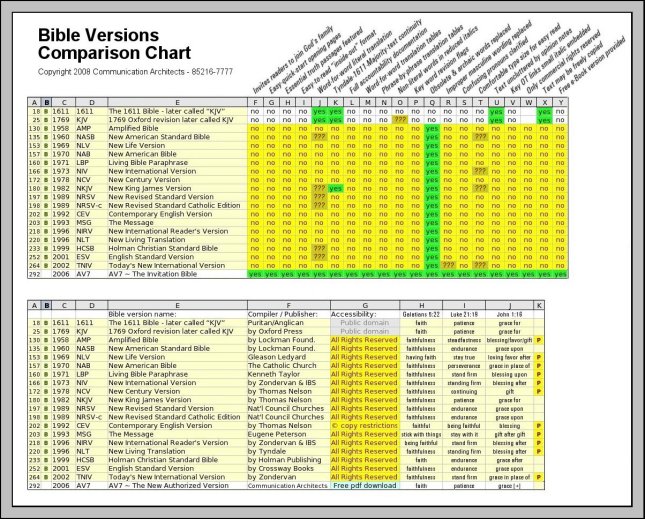Why are there so many different versions of the Bible?
How can I choose the best version to read and understand?
- Some people find Bible paraphrases easy and comfortable to read; however, to be sure of having the most trustworthy truth, it is important to test whatever you read in any Bible paraphrase or Bible that is described as a "dynamic equivalent" translation and compare the text to a more word-for-word literally accurate translation.
- There are many commercially promoted versions of the Bible that claim "All Rights Reserved" on their copyright page. Whenever a publisher claims exclusive proprietary ownership of their unique version or paraphrase of the Bible, be aware that even the smallest changes can seriously distort the truth. Therefore, be sure to carefully examine key verses to see how they have changed or deleted words.
- You do not need to be a Greek or Hebrew scholar to be able to view and consider translation examples to see how closely any given version or paraphrase conforms (or fails to conform) to the words in the original language text. The AV7 Bible provides many examples of "interlinear" (line-over-line) translation to demonstrate the accuracy of its literal word-for-word translation. Be wary of any version that does not provide such examples and documentation to validate its translation.
- Scroll down and click on some of the Bible verses listed below to see how some versions of the Bible translate or paraphrase those example verses.
- Click this link to order a copy of "How to Compare Bible Versions." This small 24-page booklet provides a very concise practical guide to help you recognize the differences between a trustworthy, accurate, word-for-word literal translation of the Bible and non-literal paraphrases and versions that often significantly alter the text.

- Click this link to view a larger image of this Bible Versions Comparison Chart >>>>>
This chart provides an objective, fact-based comparison of 20 key features and attributes as found (or not found) in 20 different versions of the Bible.
The best way to compare different versions
of the Bible is to examine how different versions translate key verses by viewing those verses in an interlinear (line-over-line) presentation.
Click on each example verse below to see if important words have been changed or omitted; and if so, question why such changes were made. Were those changes justifiable and appropriate? Or not? Or did any change perhaps distort or misrepresent important truth?
John 3:16 Check to see if the crucially important word 'begotten' is preserved and not omitted, because omitting that word seriously distorts the truth.
Galatians 5:22 Check to see if the crucially important word 'faith' is preserved and not improperly replaced by 'faithfulness' which has a very different meaning.
Mark 11:26 Check to see if this entire verse is omitted or if a footnote suggests that this important verse is not reliable.
Luke 21:19 Check to see if the important word 'patience' is preserved, or if other wording is substituted that significantly alters the meaning.
John 1:16 Check to see if a distinction is clearly made between two different kinds of grace in this verse.
Romans 1:17 Check to see if there is a clear differentiation indicated between two different degrees of faith.
Luke 7:28 Check to see if the important word 'prophet' is omitted, because omitting that word significantly distorts the truth.
There are hundreds more examples of significant changes and omissions to be added here.
Comparison examples will later be added for these and many more verses:
Matthew 5:32 ~ Matthew 5:39 ~ John 5:6 ~ John 6:47 ~ John 6:65
Matthew 4:7 ~ Matthew 5:19 ~ Acts 12:4 ~ Ephesians 2:8 ~ Hebrews 10:10
1 Corinthians 4:16 ~ Romans 15:7 ~ Psalm 19:9 ~ Proverbs 16:3
